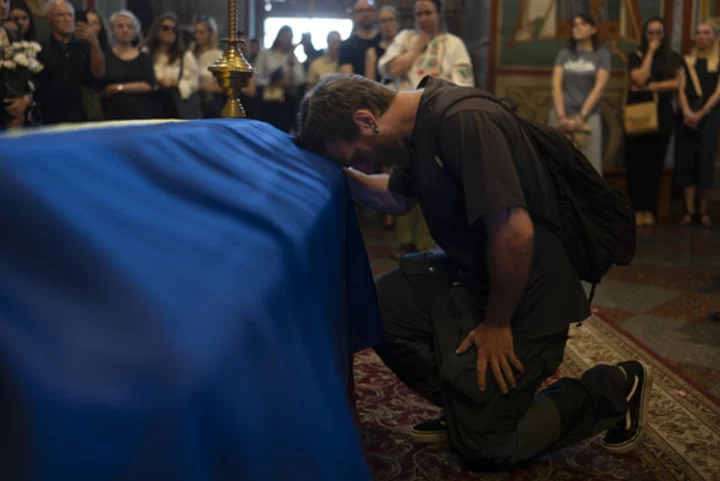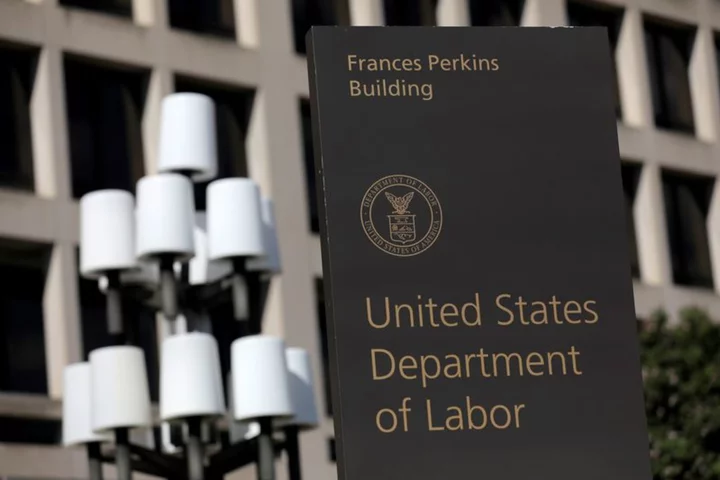KYIV, Ukraine (AP) — Dozens of people with flowers, many unable to hold back tears, bid farewell Tuesday to an award-winning Ukrainian writer who was among those killed by a Russian missile attack on a popular restaurant in eastern Ukraine.
The memorial service for Victoria Amelina, 37, was held in the crowded main hall of Saint-Michael's Cathedral in Kyiv, where ceremonies are usually held for soldiers who were killed on the battlefield.
Amelina died in a hospital from injuries sustained in the June 27 strike on a popular restaurant frequently visited by journalists and aid workers in the city of Kramatorsk. Twelve other people also lost their lives in the attack.
“Usually, we gather here to say goodbye to the most deserving,” said Archimandrite Lavrentii, the Orthodox priest leading the service. “Considering the times we live in, leading a worthy and dignified life for each of us is the best tribute we can offer in memory of those who have passed away into eternity.”
Around 100 people, including representatives from the Ukrainian literary community, relatives, and residents of Kyiv gathered at the church to honor Amelina, a prominent writer who had turned her attention from literature to documenting Russian war crimes after Russia invaded Ukraine in February 2022.
Mourners approached the closed casket, gently touching the yellow and blue Ukrainian flag covering it. Many couldn’t hold back tears. To the left of the casket, people laid flowers, some of which were adorned with ribbons in the colors of the Ukrainian flag. At the end of the farewell, a mountain of flowers stood next to a portrait of Amelina, a red-haired woman with a pale face and a penetrating gaze pictured against a dark background.
A funeral will be held Wednesday in Amelina's hometown of Lviv.
Dmytro Kovalchuk, 31, was having dinner with Amelina at the restaurant when a Russian Iskander missile struck the building. He worked as a producer for a team of writers — Amelina and a group of Colombian authors.
He said Amelina was the first one to be evacuated to the hospital. She sustained an injury when the roof collapsed, and a piece of iron reinforcement struck her head.
“Victoria remained in her seat as she was,” recalled Dmytro. It seemed like she was fine, but she didn’t respond when called by her name.
“It was an honor to work with her,” said Kovalchuk, adding that Amelina was a very polite and kind person.
After the service, the coffin and the flowers were loaded into a long black vehicle that departed for Lviv amid the strong and haunting sound of the trembita, a Ukrainian alpine horn made of wood.
Victoria Amelina is one of over 60 artists killed in Ukraine since the start of the full-scale war, said Tetiana Teren, the head of PEN Ukraine.
“She had doubts about whether literature and culture could have an impact and support the country during such a horrific genocidal war. And she began to search for her own role, what she could contribute,” said Teren, holding a Ukrainian flag, about Amelina's decision to document war crimes.
“Victoria strongly believed that we not only have to win this war, but we must bring to justice and hold accountable all those who committed crimes, who continue to kill Ukrainians and undermine our culture”.
Amelina was born Jan. 1, 1986, in Lviv. In 2014 she published her first novel, “The November Syndrome, or Homo Compatiens,” which was shortlisted for the Ukrainian Valeriy Shevchuk Prize.
She went on to write two award-winning children’s books and another novel. In 2017, her novel, “Dom’s Dream Kingdom,” received national and international accolades — including the UNESCO City of Literature Prize and the European Union Prize for Literature.
Her fiction and essays have been translated into many languages, including English, Polish, Italian, German, Croatian, Dutch, Czech, and Hungarian.
In 2021, she founded the New York Literature Festival, which takes place in a small town called New York in the Donetsk region of Ukraine.
Since the start of the invasion, Amelina had devoted herself to documenting Russian war crimes in eastern Ukraine, PEN America said. In Kapytolivka, near Izium, she discovered the diary of Volodymyr Vakulenko, a Ukrainian writer killed by the Russians.
She also began writing her first work of English nonfiction shortly before her death. In “War and Justice Diary: Looking at Women Looking at War,” Amelina recounts stories of Ukrainian women collecting evidence of Russian war crimes. It is expected to be published soon, according to PEN Ukraine.









